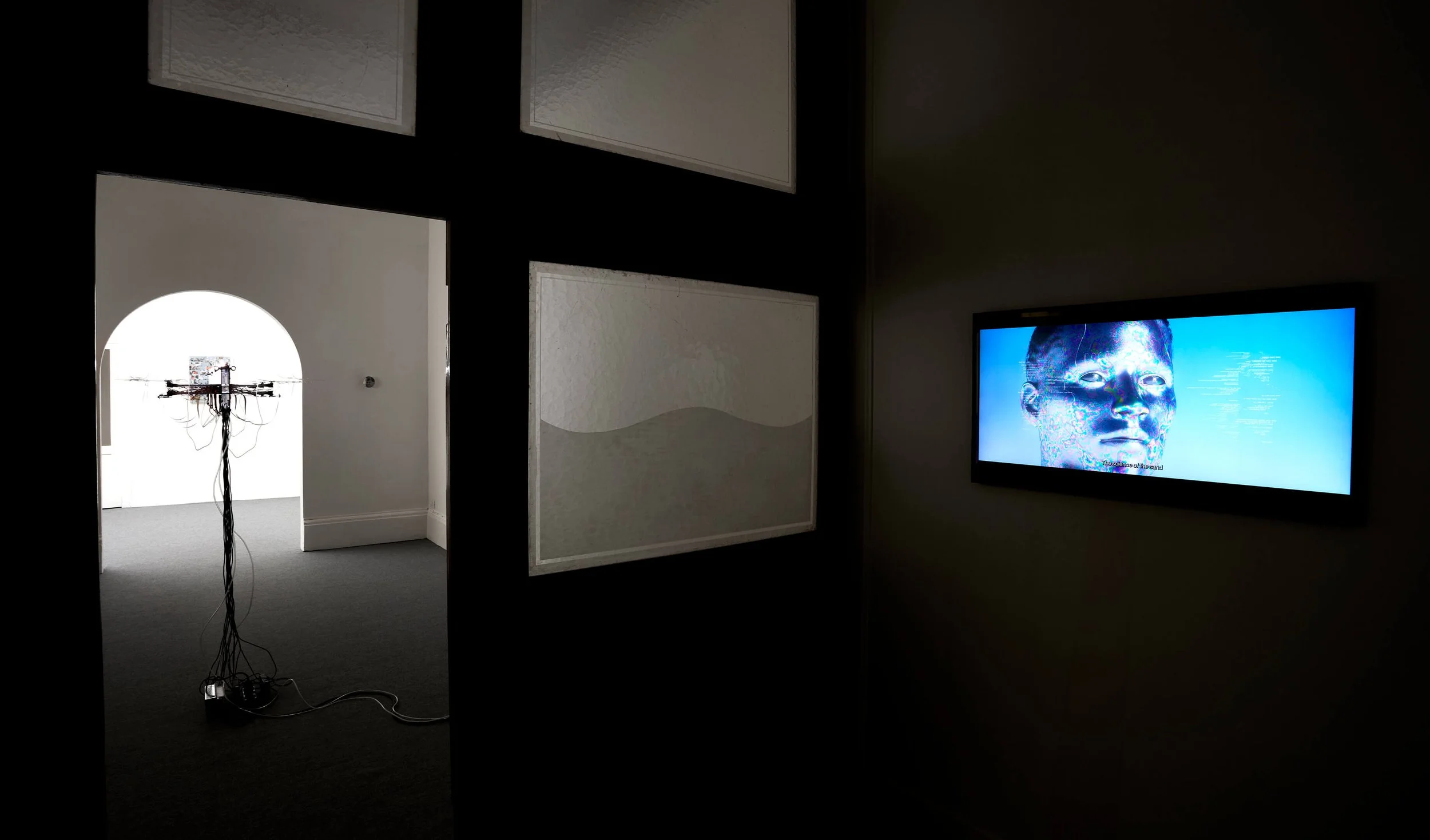“Hyperballad” at The Address, Brescia, Italy
Group show of Vladislav Markov, Sybil Montet, Tommy Malekoff, Marina Cavadini, Lorenzo Lunghi, Satoshi Fujiwara,
Sergio Sarri, Alessandro Simonini, Nygel Panasco, and Davide Dicorato at The Address through July 30
Author: Michela Cheruti
Hyperballad, Installation View: Sybil Montet and Lorenzo Lunghi. Image courtesy of The Address.
Walking into the group show Hyperballad at The Address gallery in Brescia feels a bit like stepping into a quiet sci-fi novel– one that’s been written inside the confines of a former bank. Tucked in the city center, the gallery, since 2021, occupies what was once a financial institution, and traces of that past are still very much present: thick, fortress-like walls, heavy wooden frames, and subtle architectural details that speak of solidity, control, and closed systems. But something has shifted.
For the occasion of this exhibition, the floor has been covered in a soft gray carpet – a gesture aimed at muting the space, lending it an air of clinical neutrality. Yet, the functional past seeps through, and the tension between the sterile and the storied creates a quiet friction. It’s here, in this charged atmosphere, that Hyperballad unfolds: a group show featuring ten Italian and international artists brought together by a common thread– the disquieting sense that we, as humans, are no longer the central protagonists of our own story.
Drawing from ideas of thinkers such as Rosi Braidotti, Donna Haraway, and Timothy Morton, Hyperballad does not offer answers, but rather lends a feeling of drifting at the edge. The exhibition title evokes a melancholic choreography: a ballad, something slow, but excessive, even sentimental, amplified through writing, prosthetics, and screens. It is not simply an exhibition –– it is a still performance. We witness a kind of fragile dance on a sinking raft, caught between data extraction and digital aesthetic, between disembodied algorithms and evaporating intimacy.
At the heart of the show is Lorenzo Lunghi, whose sculptural installation Spie (Fontana v.2), 2024 occupies the central room and acts as a conceptual core, a point from which the rest of the exhibition unfolds. Lunghi’s practice explores the intersection of technology, perception, and contemporary myth-making, often building on internet-born anxieties and conspiracies to create ritualistic, speculative objects. A similarly immersive sensibility underpins Sybil Montet’s 2024 video work Geomancy, which draws from fantasy and science fiction to conjure up fictive ecosystems shaped by the occult potentials of new technologies. Vladislav Markov adds another layer to this constellation: Option 957,2025 and Thanks, Vlad,2025 intervene in the space with a material logic that is both alien and oddly familiar. Markov’s altered objects feel like technological relics from a parallel dimension –– artifacts caught in a feedback loop between the digital and the physical. While Lunghi spins speculative mythologies and Montet channels techno-esoterica, Markov operates in the realm of estrangement: his objects refuse easy classification, placing the viewer in a state of disorientation. Together, these three artists form a kind of triangulated current within the show, each tracing a different arc through the collapse of human-centered narratives and the rise of ambient, post-human systems.
The exhibition also includes contributions from Tommy Malekof, Marina Cavadini, Satoshi Fujiwara, Sergio Sarri, Alessandro Simonini, Nygel Pacasco, and Davide Dicorato. Each artist brings in distinct and unique visual languages, forming together a cohesive, layered inquiry into the post-human condition, creating a connective tissue, quiet echoes that reinforce the unease central to the exhibition.
Hyperballad is not a cry for help, nor is it a litany. It is a suspended moment. An interlude of strange beauty, in which we’re asked to sit with the unease and contemplate what comes after the humans.
Hyperballad, Installation View: Tommy Malekoff and Vladislav Markov.Image courtesy of The Address.

